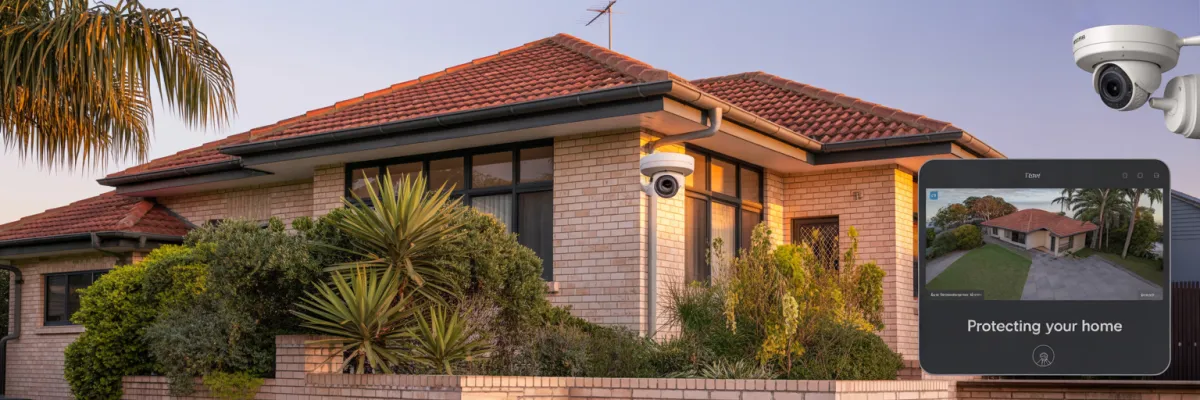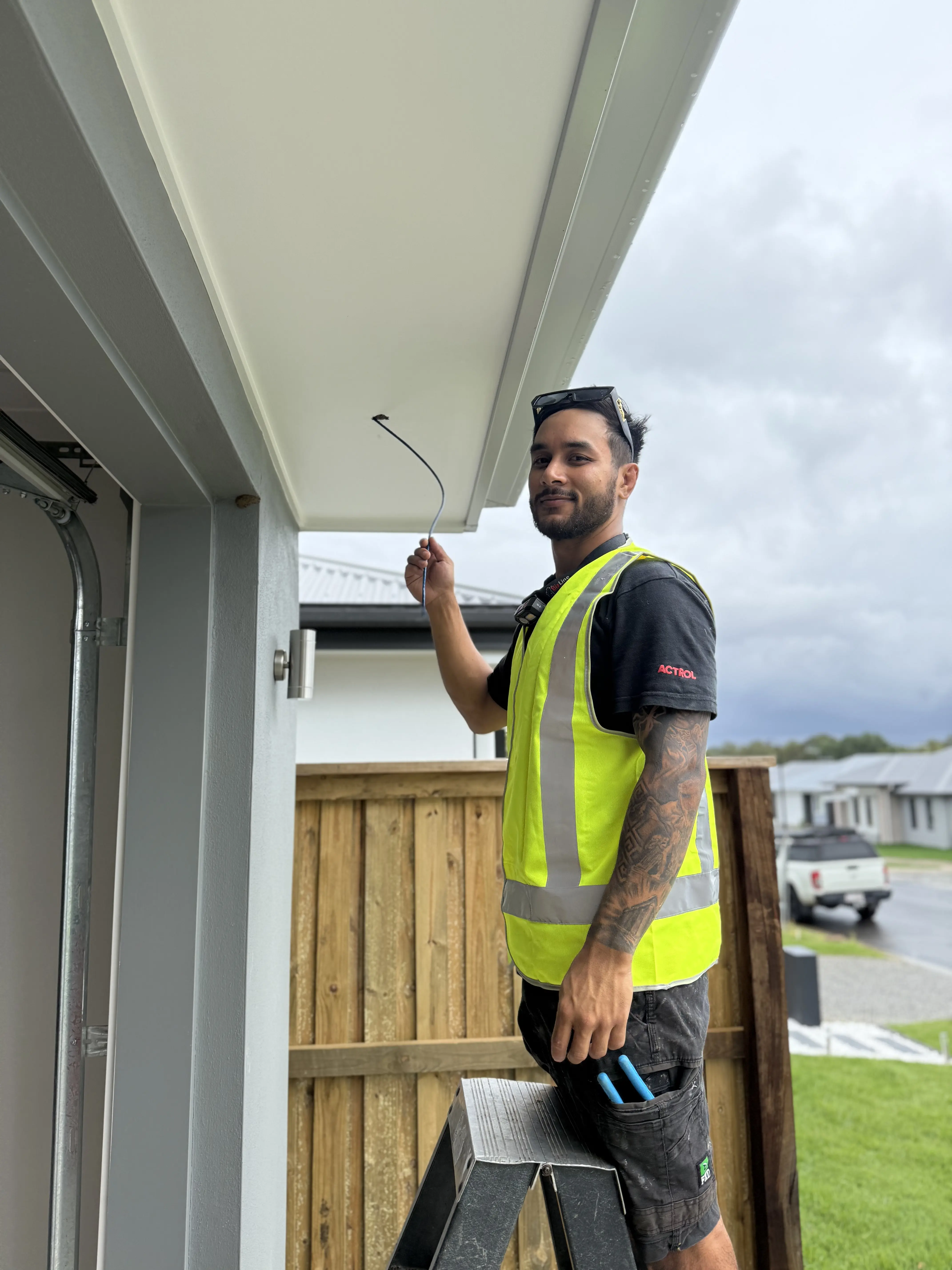
Residential CCTV Installation: What You Need to Know Before Installing Security Cameras in Your Brisbane Home
Sarah from Carindale thought her quiet street was safe until she discovered someone had been in her backyard three nights in a row. The footprints told a story she didn't want to believe - someone had been watching her family's routine. The next morning, she called about residential CCTV installation.
If you're reading this, you've probably had that same gut feeling. Maybe you've heard about break-ins on your local Facebook group, or noticed packages going missing. Brisbane homeowners are increasingly turning to residential CCTV installation as crime rates shift and neighborhoods change.
But there's a massive difference between throwing up a couple of cameras and creating a security system that actually protects your family. This guide covers everything you need to know about residential CCTV installation in Brisbane.
Understanding Residential CCTV Installation Basics
Residential CCTV installation isn't just about buying cameras and sticking them on walls. It's creating a complete security ecosystem for your home.
What is residential CCTV installation?
Think of it as strategically placing cameras to cover vulnerable areas, connecting them to a recording system, and setting up remote access so you can monitor your property from anywhere.
The difference between proper installation and DIY comes down to camera placement, system integration, and ongoing reliability. Without understanding sight lines, lighting conditions, and Brisbane's weather patterns, you might end up with expensive equipment that doesn't protect your home.
Key components
Every residential CCTV installation includes cameras, recording system (DVR/NVR or cloud-based), mobile access, storage for footage, and monitoring alerts.
Think of it like your home's nervous system - cameras are the eyes, the recording system is the brain, and mobile access connects you to what's happening.
Brisbane council regulations
Brisbane has specific regulations about where you can install security cameras. Your cameras can't record your neighbor's property or public areas beyond your boundary. You may need signage indicating CCTV monitoring.
If you're in a townhouse or unit complex, there are additional rules about common areas. Any electrical work requires a licensed electrician.
Getting this wrong means relocating cameras after installation or dealing with neighbor disputes. Professional installers know these regulations.

Types of CCTV Cameras for Brisbane Homes
Wired vs wireless security cameras
Wired cameras connect directly to your recording system through cables. They're more reliable because there's no wireless signal interference, and they don't need battery changes. Installation is more involved because you need to run cables.
For Brisbane homes, wired systems often make sense for complete installations. Our weather can be tough on wireless signals, especially during storm season.
Wireless cameras are easier to install initially, but they still need power and signals can be affected by neighbor's wifi or metal roofing common in Brisbane homes.
Most "wireless" systems are actually a mix - some cameras wired, others wireless depending on location.
Indoor vs outdoor specifications
Outdoor cameras need to handle Brisbane's weather extremes - 40-degree summer days, tropical downpours, and hail storms. Look for cameras with IP66 or IP67 ratings for dust and water protection.
Indoor cameras are smaller and more discreet, but they're not built for weather exposure. Using an indoor camera outside results in a dead camera within months.
Many Brisbane homeowners make the mistake of buying indoor cameras and putting them under eaves. "Under the eaves" isn't the same as weatherproof when storms hit.
HD vs 4K resolution
HD cameras (1080p) provide clear enough footage to identify faces and license plates at reasonable distances. For most Brisbane homes, this resolution is perfectly adequate.
4K cameras capture incredibly detailed footage, but create massive files that eat up storage space quickly. Unless you need to capture fine details at long distances, 4K might be overkill.
Here's the practical test: if you can't identify someone's face in 1080p footage, moving to 4K probably won't help because the issue is likely camera placement, not resolution.
Night vision and weather resistance
Brisbane's long summer nights and unpredictable weather make these features non-negotiable for outdoor cameras.
Night vision comes in infrared (black and white) or color night vision. Infrared works in complete darkness but you lose color information. Color night vision needs some ambient light but provides more useful footage.
Weather resistance isn't just about rain. Brisbane's UV levels are brutal on camera housings, and humidity can cause condensation problems in cheaper cameras.
Look for cameras specifically rated for Australian conditions. Some manufacturers design for European or American climates, which don't match our weather patterns.
Professional CCTV Installation vs DIY
You've probably watched YouTube videos and thought "I can do this myself." Maybe you can, but let's talk about what you're really signing up for.
Benefits of professional installation
Professional installers see problems you won't think about. They know that the perfect spot for a camera might have terrible lighting at night, or that your tree will block the view in six months.
Professional installers know which cameras hold up in Brisbane's climate. They've seen the failures and know what works long-term. A professional job looks intentional with hidden cables, properly positioned cameras, and everything integrated with your existing systems.
When something goes wrong, you have someone to call. Professional installers handle electrical work legally and know all local regulations.
DIY installation challenges
DIY residential CCTV installation requires more than a screwdriver. You need cable running tools, testing equipment, and often a drill capable of going through Brisbane's double-brick construction.
When cameras aren't talking to your recording system, can you trace the problem? Network issues, power problems, and configuration errors can take hours to solve.
Cameras get dirty during Brisbane's dusty, stormy seasons. Software needs updates. Equipment fails. Are you prepared to climb ladders and troubleshoot technical problems for years?
Here's what one Brisbane homeowner told me: "I spent three weekends installing my system and another two weekends fixing problems. I should have just hired someone."
Long-term value considerations
DIY installations require tools, time for installation and troubleshooting, replacement equipment when things go wrong, and carry risk of potential home damage.
Professional installation includes proper equipment selection, clean code-compliant installation, system configuration and testing, training, and ongoing support and warranty.
The reliability factor matters most - a DIY system that works 80% of the time isn't really a security system. Professional installations are designed for 99%+ reliability.
Strategic Camera Placement for Maximum Home Security
This is where most DIY installations fall apart. You can buy the best cameras, but if they're pointing at wrong spots, you might as well hang up cardboard boxes.
Essential coverage areas for Brisbane homes
Front and back doors are your main entry points where you'll capture clearest footage of anyone approaching. Position cameras to get face-on shots, not just the top of someone's head.
Driveways and vehicle areas need coverage because car theft and vandalism are real problems in Brisbane suburbs. You want cameras that capture license plates and identify people approaching vehicles.
Many Brisbane homes have side access to backyards. These are common entry points for break-ins because they're often hidden from street view.
If you have expensive outdoor equipment, BBQs, or pool areas, these need coverage. Pool safety monitoring gives parents extra peace of mind.
One or two indoor cameras in main areas help if someone gets inside, and they're useful for monitoring when you're away.
Common placement mistakes
Cameras mounted too high give you great shots of tops of heads. Too low and they're easily tampered with. The sweet spot is usually 8-10 feet high.
Indoor cameras pointing toward windows create glare and reflection problems that make footage useless during daylight. That perfect spot during the day might be completely dark at night.
While visible cameras can deter crime, cameras that are too obvious are also easy targets for vandalism. That clear sightline might be blocked by tree growth in six months. Brisbane's fast-growing vegetation can quickly ruin camera views.
A family in Logan invested heavily in cameras around their home. When their shed was broken into, they discovered their cameras had captured nothing useful - wrong angles, too much glare, and one camera was blocked by a branch.
Privacy considerations and neighbor relations
Getting camera placement wrong can turn friendly neighbors into enemies and land you in legal trouble.
Your camera can't record your neighbor's property, even accidentally. This affects placement more than most people realize. You can't record public footpaths or streets beyond what's reasonably necessary.
Talk to your neighbors about your plans. Most people are supportive when they understand you're trying to secure your property, not spy on them.
Angle cameras to avoid capturing neighbor's windows, outdoor areas, or pools. You can still secure your property without invading their privacy.
The best approach is involving neighbors in the conversation early. Many Brisbane homeowners find that neighbors are interested in coordinating security efforts, especially if there have been incidents in the area.

Choosing the Right CCTV Installation Company in Brisbane
This decision can make or break your security investment. Choose the wrong installer and you'll deal with problems for years.
Certifications and licensing requirements
Professional residential CCTV installation requires several certifications and licenses in Queensland. Any mains power work must be done by a licensed electrician.
Installers working on security systems need appropriate Queensland security licensing. Professional installers carry public liability and professional indemnity insurance.
Look for membership in organizations like ASIAL (Australian Security Industry Association Limited). Quality installers often have certifications from major camera manufacturers.
Ask to see actual documentation. Professional installers are proud of their certifications and happy to show them.
Ready to Secure Your Brisbane Home?
You now have the knowledge to make an informed decision about residential CCTV installation for your Brisbane home. You understand different camera types, what separates professional installation from DIY attempts, and how to choose the right installer.
Remember Sarah from Carindale? She chose professional installation after researching her options. Six months later, her cameras captured footage of someone attempting to break into her neighbor's shed, helping police catch the offender and making her entire street safer.
That's the reality of good residential CCTV installation - it's not just about protecting your own family, it's about contributing to your community's overall safety.
Your security system is only as good as its weakest link. Cheap cameras, poor placement, or unreliable installation can leave you with expensive equipment that doesn't actually protect your home.
Brisbane's unique conditions require local expertise. An installer who understands these challenges will deliver a system that works reliably for years through proper equipment selection, strategic placement, warranty coverage, and ongoing support.
Don't wait until something happens to wish you'd acted sooner. Security systems are most effective as prevention tools, not just evidence collection.
Your next step: Get quotes from at least three professional residential CCTV installation companies in Brisbane. Ask the questions we've outlined, check their certifications, and choose based on expertise and service quality.
The installer you choose today will determine whether your security system becomes a reliable guardian for your family or an ongoing source of frustration. Choose wisely - your family's safety depends on it.


